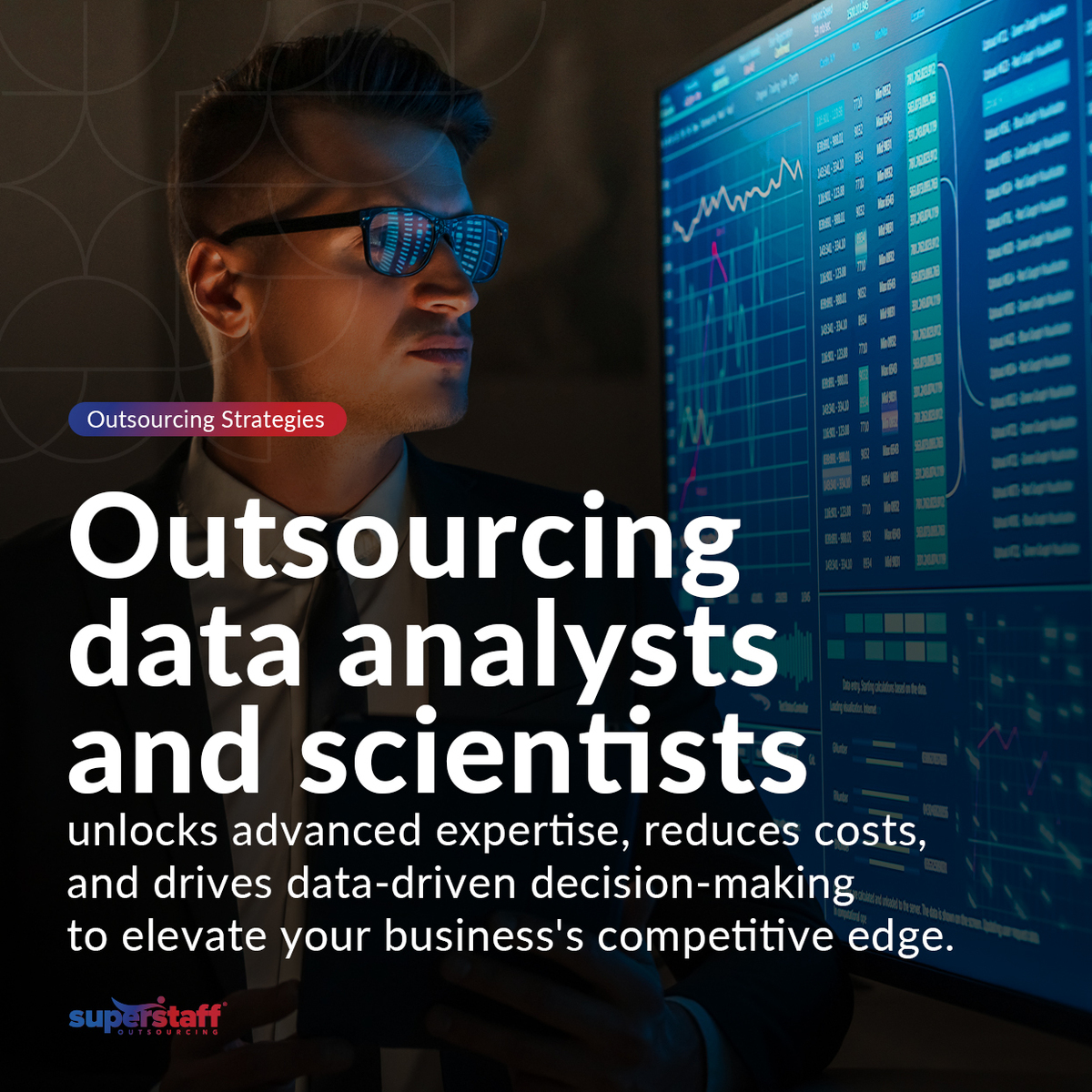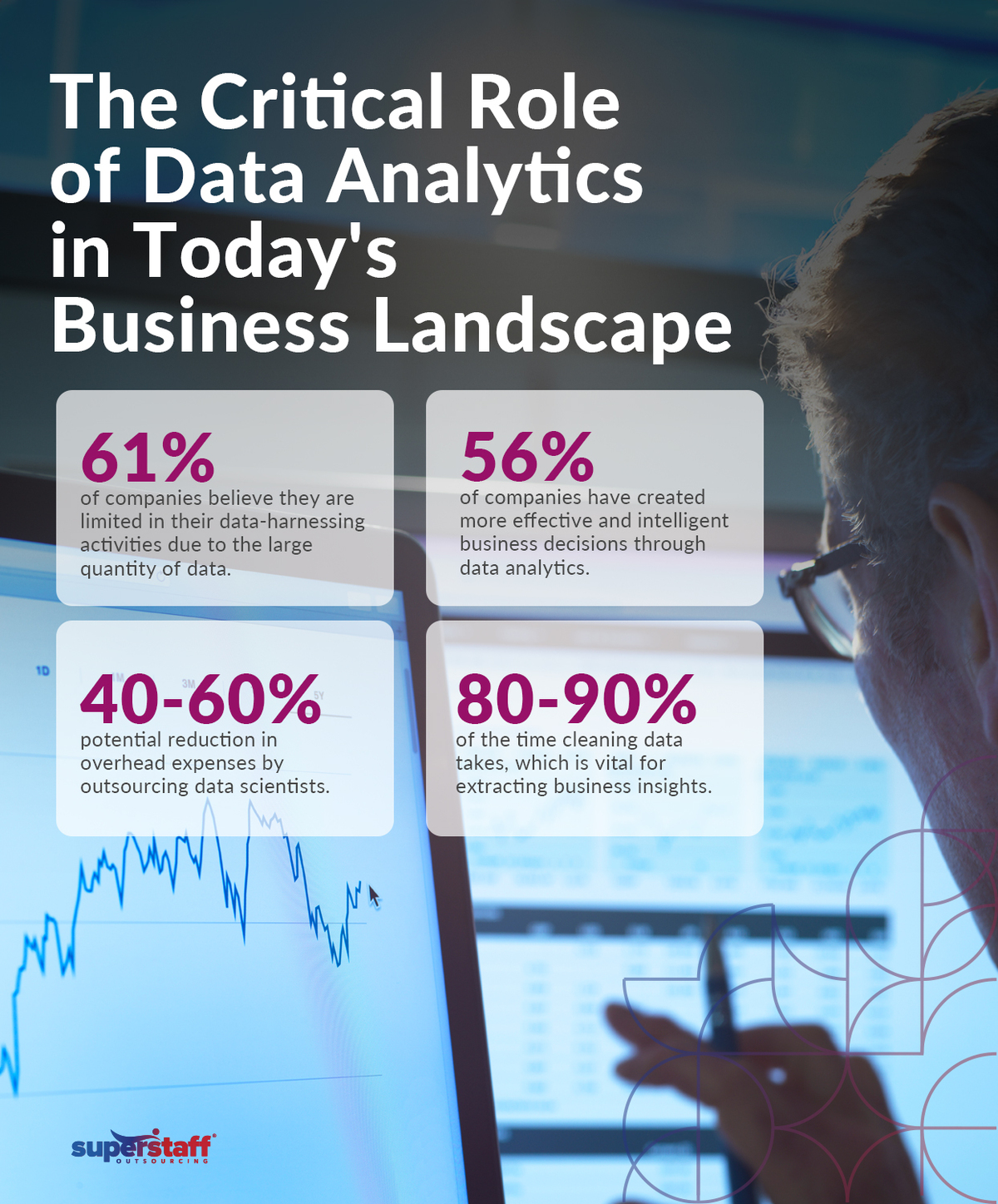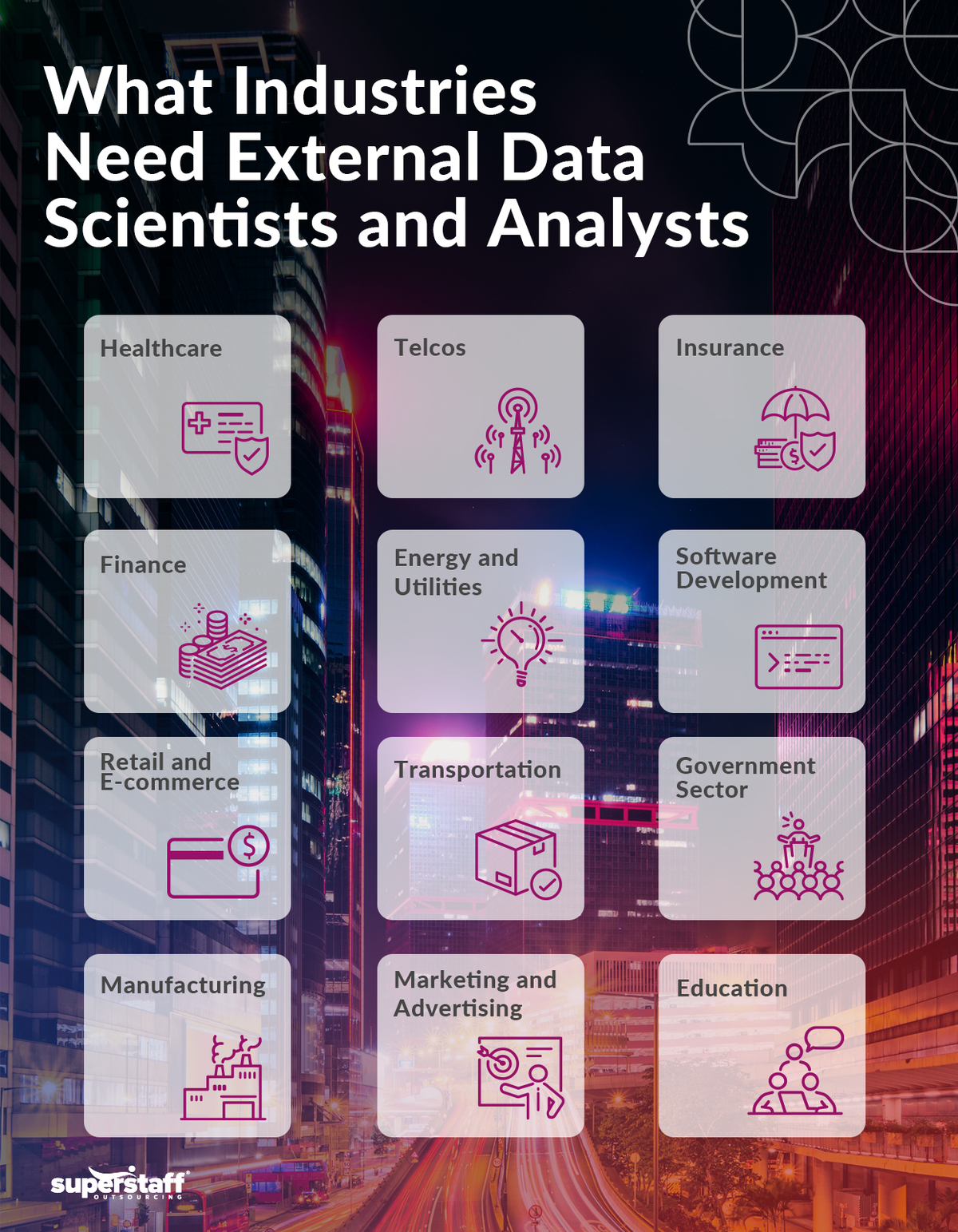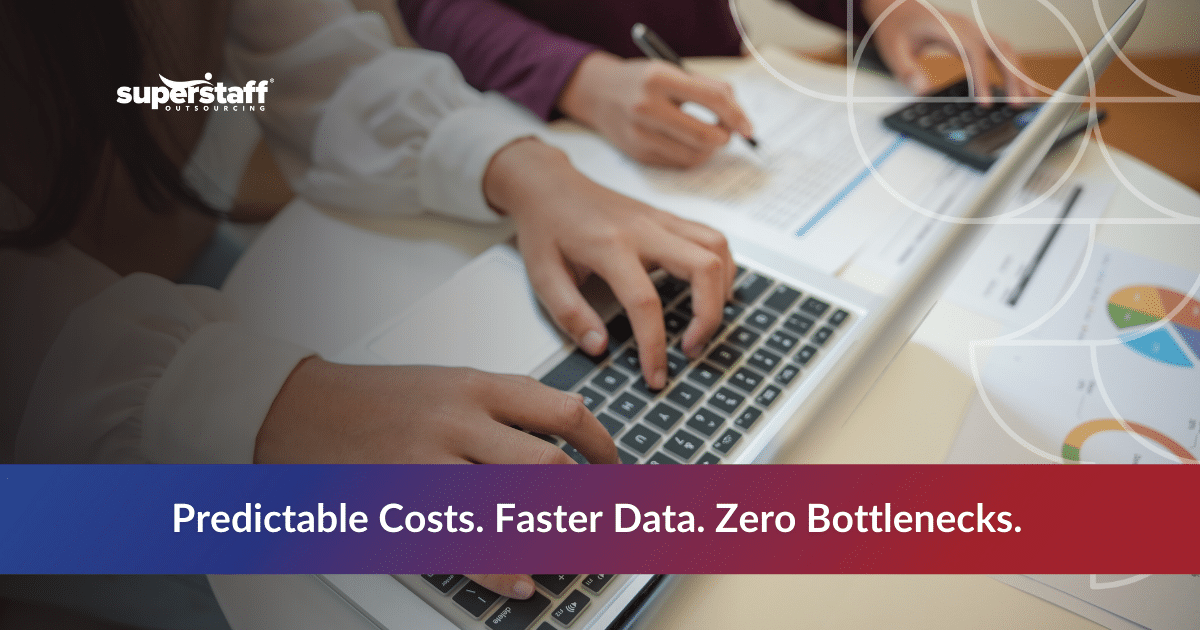
Imagine unlocking hidden patterns in your business data that could revolutionize your decision-making process.
In today’s data-driven world, business leaders like you must effectively utilize data, where the expertise of external data scientists and analysts becomes invaluable. These professionals bring fresh perspectives and specialized skills, transforming raw data into powerful business insights.
This guide delves into the critical role of external data professionals in enhancing decision-making and elevating business intelligence to new heights. Prepare to discover how their expertise can lead to game-changing strategies and unparalleled growth for your business.
The Growing Importance of Data Scientists in Today’s Business Landscape
The explosion of data has fundamentally transformed how businesses operate. Today, data analysis is crucial for strategic planning and overall business success.
The Evolution of Data Analytics in Business
Data analytics began in the 1950s when businesses recognized the necessity of automating manual data processing. This era saw the advent of computers for data processing and storage. By the 1970s, the business intelligence (BI) field had emerged, providing foundational tools for data analysis.
Over the years, advancements such as cloud computing and self-service analytics platforms have revolutionized the field. These innovations have empowered business owners to analyze data independently, even with limited technical skills.
Integrating artificial intelligence (AI) into data analytics has become pivotal today. AI enhances data analysis and automates business decision-making processes, making them more efficient and accurate.
Challenges Businesses Face in Managing and Analyzing Large Datasets
The rapid evolution of data analytics has brought about significant challenges in managing and analyzing large datasets. One of the primary obstacles is the sheer volume of data, often reaching petabytes in size. This overwhelming quantity can hinder effective data utilization.
In addition to volume, the velocity at which data is generated poses a challenge. Real-time data generation requires timely analysis to create actionable insights. The variety of data, ranging from text and images to social media and multimedia content, further complicates the process.
Ensuring the accuracy and validity of large datasets is crucial, as is compliance with data privacy regulations like the General Data Protection Regulation (GDPR). These factors make managing large datasets a complex task.
The Urgent Need for Data Scientists
Given these challenges, data scientists have become indispensable. Their expertise is critical in navigating the complexities of large datasets and extracting meaningful insights. Businesses can effectively address data-related challenges and harness their full potential by hiring skilled data professionals.
Why Hire External Data Scientists and Analysts?

External data scientists and analysts bring specialized expertise that complements the core functions of your in-house team. Their contributions include objectivity, advanced data skills, and a cost-effective approach.
Fresh Perspectives and Unbiased Insights
Research indicates that data analytics has enabled 56% of companies to make more effective and intelligent business decisions. External data scientists, with their proficiency in data science, statistical analysis, and computer science, provide innovative perspectives and unbiased insights. They analyze large datasets to produce actionable business insights, ensuring data consistency and eliminating biases.
Access to Cutting-edge Tools and Methodologies
Engaging external data scientists gives you access to state-of-the-art tools. For instance, comparative analysis allows you to gauge your company’s performance against competitors, while sentiment analysis helps interpret customer perceptions, offering more profound insights into service improvements and strategic decisions.
Cost Savings Compared to Maintaining In-house Teams
Outsourcing data science tasks can significantly reduce costs, potentially lowering overhead expenses by 40-60%. This approach allows your in-house team to concentrate on primary tasks while external experts handle data-related needs, ensuring a cost-effective solution for data management.
Understanding these advantages provides a foundation for exploring the critical roles and contributions of external data scientists and analysts.
Critical Roles of External Data Scientists and Analysts

External data scientists and analysts offer broad skills and expertise to support your business goals. Here’s how they contribute to generating valuable business insights:
Data Collection and Cleaning
Data cleaning, which consumes 80-90% of the time in data projects, is crucial for deriving business insights. Data scientists ensure data accuracy and reliability by extracting and processing raw data to make it relevant for insights and decision-making. They utilize tools like data wrangling to clean and analyze large data sets efficiently.
Advanced Analytics and Modeling
Data scientists leverage advanced analytics to benefit your business exceptionally. Advanced data analytics can uncover market trends and meet customer demands. Some examples include:
- Machine Learning: Uses algorithms to process data without explicit programming.
- Descriptive Modeling: Analyzes events in detail to identify trends.
- Predictive Modeling: Predicts future scenarios based on past data, aiding in efficient decision-making.
- Data Mining: Uncovers hidden patterns and essential insights.
Visualization and Reporting
Data scientists excel at making complex data sets accessible and understandable for stakeholders. They present data in visually appealing formats, such as graphs and charts, simplifying it for better comprehension. By tailoring presentations to the stakeholders’ technical knowledge, they ensure everyone is on the same page, emphasizing critical insights without overwhelming the audience with excessive information.
Industries Benefiting from External Data Scientists and Analysts
Having explored data scientists’ and analysts’ key roles and contributions, we see that their expertise can significantly impact business decisions and outcomes across various industries. Integrating external data professionals is a strategic move to enhance business intelligence and drive success in healthcare, finance, retail, or technology.
Many industries stand to gain significantly from the expertise of external data scientists and analysts. Here are some key sectors where their specialized skills are particularly valuable:

Healthcare
- Patient Data Analysis: Enhancing patient outcomes through detailed analysis.
- Predictive Analytics: Forecasting disease outbreaks and optimizing treatment plans.
- Operational Efficiency: Streamlining hospital management and operations.
Finance
- Risk Assessment and Fraud Detection: Identifying and mitigating financial risks and fraudulent activities.
- Algorithmic Trading: Developing strategies for automated trading and investment.
- Customer Segmentation: Offering personalized financial services based on customer data.
Retail and E-commerce
- Customer Behavior Analysis: Tailoring marketing efforts to individual customer preferences.
- Inventory Management: Forecasting demand and managing stock levels.
- Sales Trend Analysis: Analyzing sales data to inform pricing strategies.
Manufacturing
- Predictive Maintenance: Anticipating equipment failures to prevent downtime.
- Supply Chain Optimization: Improving efficiency in the supply chain.
- Production Process Improvement: Enhancing the overall manufacturing process.
Telecommunications
- Network Optimization: Enhancing network performance and predicting faults.
- Customer Churn Analysis: Identifying and reducing customer turnover.
- Product Development: Creating new products and services based on usage data.
Energy and Utilities
- Predictive Maintenance: Maintaining infrastructure proactively to avoid failures.
- Energy Consumption Forecasting: Predicting energy needs and optimizing resource use.
- Resource Allocation: Efficiently distributing energy resources.
Transportation and Logistics
- Route Optimization: Improving route planning for better fuel efficiency.
- Predictive Maintenance: Ensuring vehicles and equipment are maintained before failures occur.
- Supply Chain Management: Enhancing logistics and supply chain operations.
Marketing and Advertising
- Customer Segmentation and Targeting: Focusing marketing efforts on specific customer groups.
- Campaign Performance Analysis: Measuring and improving marketing campaign effectiveness.
- Sentiment Analysis: Monitoring brand perception and public sentiment.
Insurance
- Risk Modeling and Fraud Detection: Assessing risks and identifying fraudulent claims.
- Customer Segmentation: Creating personalized policy offerings.
- Claims Processing Efficiency: Streamlining claims processing.
Technology and Software Development
- Product Usage Analytics: Understanding user behavior to improve products.
- A/B Testing: Optimizing features through controlled experiments.
- Cybersecurity: Detecting and preventing cyber threats.
Government and Public Sector
- Public Health Data Analysis: Informing health policy and planning.
- Crime Data Analysis: Enhancing predictive policing strategies.
- Infrastructure Planning: Managing public infrastructure projects efficiently.
Education
- Student Performance Analytics: Personalizing learning plans for better educational outcomes.
- Resource Allocation: Optimizing the use of educational resources.
- Predictive Analytics: Forecasting enrollment trends and improving student retention.
Each of these industries can leverage the specialized skills of external data scientists and analysts to drive innovation, enhance efficiency, and make data-driven decisions that significantly improve overall performance.
The Vital Role of External Data Scientists and Analysts in Your Business
External data scientists and analysts are crucial for generating valuable business insights and enhancing your data-driven decision-making processes. As data grows in volume and speed, the need for unbiased, cost-effective, and innovative approaches becomes increasingly essential.
These experts are essential in ensuring your data is high-quality, accessible, and well-organized. Their impact spans various industries, including healthcare, finance, and customer service, demonstrating the significant benefits of outsourcing data science.
At SuperStaff, we recognize and champion the transformative power of data in driving impactful decisions and best practices. We can connect you with data scientists equipped with cutting-edge tools and advanced skills.
Embrace the future of data science and analytics with SuperStaff.






